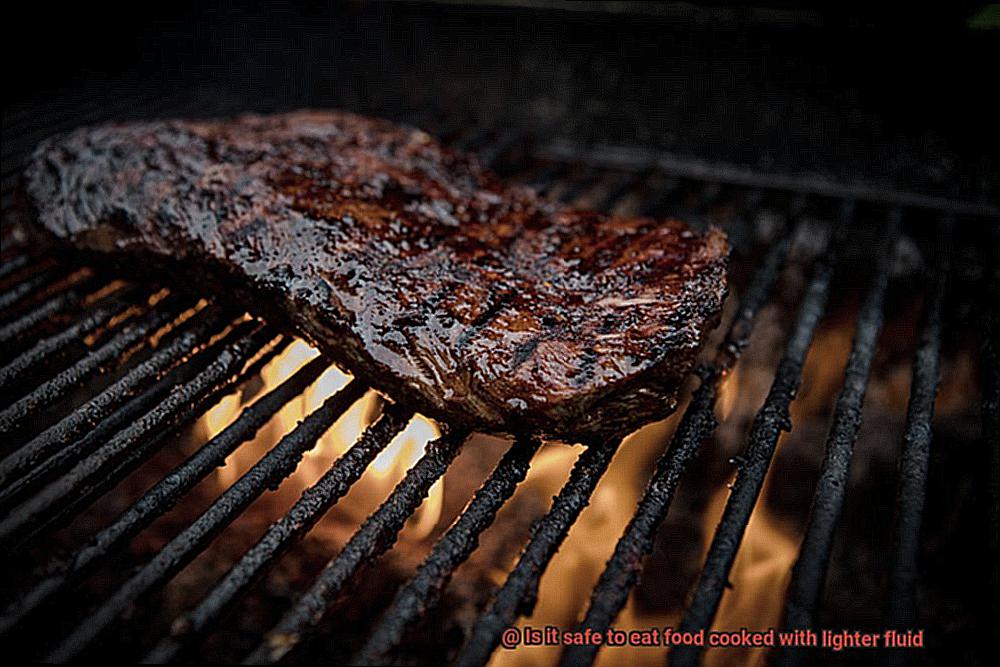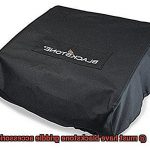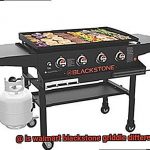It’s that time of year again – barbecue season. Time to dust off your trusty grill, grab some friends and family, and cook up some mouth-watering meals. But before you get too excited, have you ever thought about the safety of the fuel you’re using to cook your food? Specifically, is it safe to eat food cooked with lighter fluid?
Lighter fluid is a popular choice among charcoal grill enthusiasts because it can easily ignite charcoal. However, this flammable liquid contains chemicals that can be harmful if ingested. So, is it worth the risk?
In this article, we’ll delve into the potential dangers associated with using lighter fluid to cook food. We’ll explore the chemicals found in lighter fluid and their impact on your health. Plus, we’ll discuss the possibility of accidents that can occur when using this volatile liquid.
But don’t worry – we’re not here to rain on your parade. We want you to enjoy your summer barbecues safely. That’s why we’ll also provide alternatives that may be safer and healthier for you and your loved ones.
So whether you’re a seasoned grill master or just starting out, keep reading to find out all you need to know about using lighter fluid to cook your next barbecue meal – without putting yourself or others at risk.
Contents
What is Lighter Fluid?
When it comes to grilling, lighter fluid can be a lifesaver. This chemical substance is designed to help start a fire quickly and efficiently so that your grill can be ready for cooking in no time. However, as with any useful tool, there are also some risks associated with using lighter fluid.
So, what exactly is lighter fluid? It’s typically made from a combination of petroleum distillates, alcohol, and other solvents. These chemicals are highly flammable and effective at starting fires. However, it’s important to use caution when handling and using lighter fluid.
One of the biggest concerns with lighter fluid is that it can leave behind residue on the food being cooked. This residue can contain harmful chemicals that are not meant for consumption and can lead to health issues if ingested regularly. To minimize this risk, make sure all of the lighter fluid has burned off before placing any food on the grill.
Another concern with using lighter fluid is that it can be dangerous if not handled properly. Always follow the instructions carefully and avoid applying too much fluid, as this can cause an uncontrolled fire that may lead to serious injury or property damage.
To avoid these risks, consider using natural fire starters such as kindling or newspaper instead of lighter fluid. You can also let the charcoal or wood chips burn for a longer period of time before placing any food on the grill.
Potential Risks of Eating Food Cooked with Lighter Fluid
You might want to think twice before reaching for that bottle of lighter fluid. Cooking food with lighter fluid can pose potential health risks that you should be aware of.
One of the most significant risks associated with using lighter fluid is chemical contamination. Lighter fluid contains harmful chemicals like butane, propane, and pentane that can infiltrate the food being cooked. This can lead to a tainted chemical taste and odor in the food, which is certainly not what you want to serve your guests.
Another danger of cooking with lighter fluid is the possibility of flare-ups. Pouring lighter fluid onto hot coals can create an immediate flame that can burn your food or even cause injury to people around the grill. Inhaling the fumes from these flare-ups is also harmful to human health.
Moreover, lighter fluid can leave residue on cooking surfaces that can transfer to food and cause gastrointestinal problems and nausea. These health issues can ruin your day, and nobody wants that.
So how can you reduce these potential risks? Here are some tips:
- Use natural fire starters instead of lighter fluid. They are safer and don’t contain harmful chemicals.
- Follow safety instructions when using lighter fluid, and avoid pouring it onto hot coals.
- Allow the coals to burn down completely before cooking to avoid flare-ups.
- Consider using a chimney starter instead of lighter fluid.
How to Minimize the Risk of Consuming Harmful Chemicals from Lighter Fluid
Grilling is a beloved pastime for many, but it’s important to keep in mind the potential risks associated with using lighter fluid. Fortunately, there are several steps you can take to minimize these risks and safely enjoy your grilled meals. Here are five sub-sections to consider:
Use lighter fluid in moderation
Using too much lighter fluid can cause flare-ups, which can lead to harmful chemicals lingering on your food. To avoid this, use no more than 1/4 cup of lighter fluid per pound of charcoal.
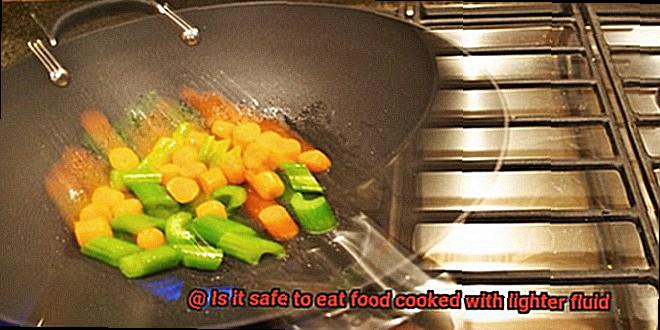
Wait for the lighter fluid to evaporate
Before lighting the charcoal, wait for the lighter fluid to completely evaporate. This can take up to 10 minutes depending on the amount used and environmental conditions. Waiting ensures that any harmful chemicals have dissipated before your food is exposed to the heat.
Opt for natural fire starters
Instead of using lighter fluid, consider using natural fire starters such as kindling, wood chips, or newspaper. These options are safer and more environmentally friendly compared to lighter fluid and do not leave behind any harmful residue.
Choose high-quality lighter fluid
When purchasing lighter fluid, look for products specifically designed for grilling that do not contain toxic substances like benzene or naphthalene. Avoid using cheaper or generic brands that may contain harmful additives.
Consider alternative methods to light your grill
Chimney starters or electric starters are safer and easier options compared to using lighter fluid. They do not require additional chemicals and are more environmentally friendly.
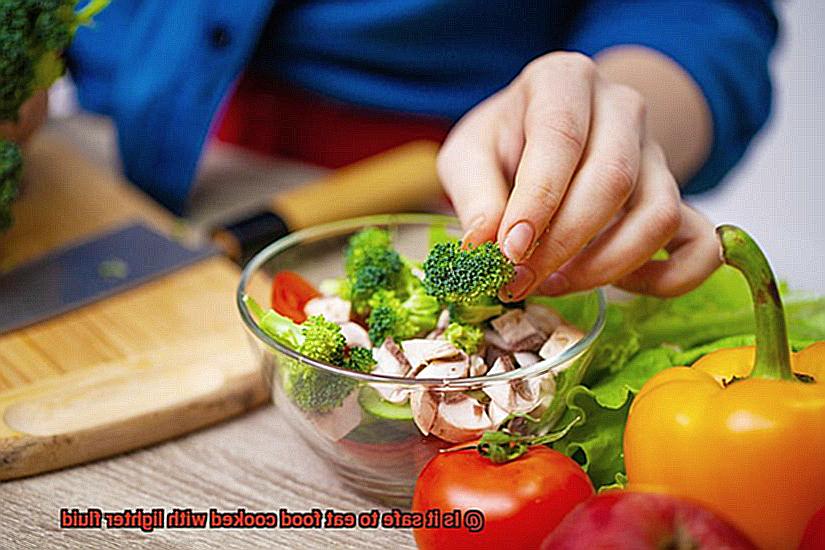
Advantages and Disadvantages of Using Lighter Fluid for Grilling
If so, you’re likely familiar with the debate over whether or not to use lighter fluid for grilling. While it has its advantages, it also comes with some significant disadvantages that are worth considering before you fire up the grill. As an expert in this field, let me break down the pros and cons of using lighter fluid for grilling.
Let’s start with the advantages. One of the most significant benefits of using lighter fluid is that it’s quick and convenient. With just a few squirts of lighter fluid, you can start a fire quickly and ensure your grill reaches the desired temperature in no time. Lighter fluid is also cost-effective, making it a popular choice for those who grill frequently. And perhaps most importantly, it’s easy to use, even for beginners.
However, those advantages come with some significant disadvantages as well. One obvious disadvantage is the toxic fumes that lighter fluid produces when burned. These volatile organic compounds (VOCs) can be harmful to your health when inhaled excessively. Additionally, using too much lighter fluid can result in a chemical taste on your food, affecting its overall flavor and making it less enjoyable. And finally, the environmental impact of using lighter fluid is not to be ignored- it’s made from petroleum-based products that contribute to air pollution and can harm wildlife.
To dive deeper into the topic, here are some sub-topics that highlight the advantages and disadvantages of using lighter fluid for grilling:
Advantages
- Quick and Convenient: Using lighter fluid allows you to start your fire quickly and ensures your grill reaches the desired temperature in no time.
- Cost-effective: Lighter fluid is relatively cheap and readily available, making it a cost-effective option for those who grill frequently.
Easy to Use: Using lighter fluid is easy, even for beginners.
Disadvantages
- Toxic Fumes: The VOCs produced by lighter fluid can be harmful to your health when inhaled excessively.
- Chemical Taste: Using too much lighter fluid can result in a chemical taste on your food, affecting its overall flavor and making it less enjoyable.
Environmental Impact: The use of lighter fluid contributes to air pollution and can harm wildlife.
Different Types of Natural Fire Starters and How They Can Be Used Instead of Lighter Fluid
Starting a fire for grilling can be a hassle, especially when using lighter fluid. Not only can it be harmful to your health, but it can also leave harmful residue on your food. Fortunately, there are natural fire starters available that not only provide a safer alternative to lighter fluid, but they’re also better for the environment. Here are five different types of natural fire starters and how they can be used:
Kindling
Kindling is small pieces of dry wood that can be used to start a fire. It’s important to use dry kindling as wet kindling will not burn well and can produce excess smoke. Simply place the kindling at the bottom of the grill, light it with a match or lighter and then add your charcoal or wood.
Wax-Based Fire Starters
These are small cubes or sticks made from a combination of wax and sawdust. They can be lit with a match and placed under the wood to start the fire. They’re perfect for camping trips or backyard fires and are also eco-friendly.
Newspaper
Crumpled up newspaper can be used to start a fire as it burns quickly and easily. Place the crumpled up newspaper at the bottom of the grill, add your charcoal or wood on top, and light the paper with a match. Make sure to use newspapers that do not contain colored ink, as this can release harmful chemicals.
Charcoal Chimney Starter
A charcoal chimney starter is a metal cylinder with a handle on the side and a grate at the bottom. To use it, you fill the top of the cylinder with charcoal and place some crumpled newspaper or other kindling in the bottom grate. Once you light the newspaper, it will ignite the charcoal and get your fire going in no time.
Electric Charcoal Starter
An electric charcoal starter is a heating element that you place in your pile of charcoal. It heats up quickly and gets your charcoal burning without the need for lighter fluid. They’re easy to use and are perfect for those who want a hassle-free grilling experience.
Tips for Safely Using Lighter Fluid When Grilling
Grilling is a popular cooking method that many people enjoy during the summer months. However, using lighter fluid to start a grill can be dangerous if not done properly. To ensure that you are using lighter fluid safely when grilling, here are some tips to keep in mind.
Use the Right Amount of Lighter Fluid
Using the right amount of lighter fluid is crucial for starting a grill safely. Using too much can cause large flames that can lead to burns or fires, while using too little may make it difficult to start the grill. To get the right amount, use about 1/4 cup of lighter fluid per pound of charcoal. Make sure to measure carefully and avoid eye-balling it.
Wait Before Lighting
After applying lighter fluid, it’s important to wait before lighting the grill. This gives the fluid enough time to soak into the charcoal, reducing the risk of flare-ups once it’s lit. Wait for a few minutes before lighting your grill to ensure that the fluid has had enough time to absorb.
Light Carefully
When it’s time to light the grill, use long-handled matches or a long-handled lighter to avoid getting too close to the flame. Never use gasoline or other flammable liquids to start your grill as they can cause an explosion. If you’re using a lighter, make sure it’s fully extended before lighting.
Keep Children and Pets Away
When using lighter fluid, make sure to keep children and pets away from the grill until it’s fully lit and the flames have died down. An unattended grill can quickly become a hazard for curious children and pets. Make sure to store any unused lighter fluid in a safe place where they cannot access it.
Consider Natural Fire Starters
Consider using natural fire starters such as kindling or newspaper instead of lighter fluid. These options are safer and healthier alternatives as they do not contain any harmful chemicals that can be ingested when cooking. Additionally, they are environment-friendly.
Conclusion
In conclusion, while using lighter fluid to cook food on a grill may seem like a convenient option, it’s important to be aware of the potential risks involved. The chemicals present in lighter fluid can contaminate your food and lead to health issues if consumed regularly. Moreover, accidents are not uncommon when using lighter fluid – flare-ups can burn your food or even cause injuries to those around the grill.
To minimize these risks, it’s crucial to use lighter fluid in moderation and allow it to evaporate completely before lighting up the grill. You can also opt for natural fire starters such as kindling or newspaper that don’t leave behind any harmful residue on your food. Choosing high-quality lighter fluids that don’t contain toxic substances like benzene or naphthalene is another way of ensuring safety.
Grilling is an activity enjoyed by many, but it shouldn’t come at the cost of compromising your health and safety. By following these tips and considering alternative methods of starting a fire, you can ensure that your barbecues are both enjoyable and risk-free. So why wait?

